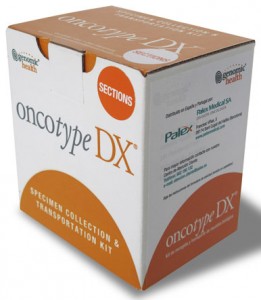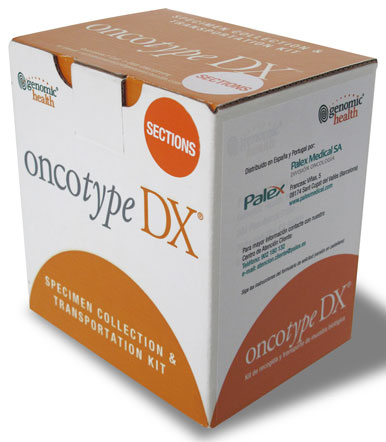 Genomic Health, a provider of genomic-based diagnostic tests for treatment of early stage cancer, revealed positive results of a health economic study that demonstrates the direct reduction of medical costs and improvement of quality of life of the use of the Oncotype DX colon cancer test. The conclusions of the analysis conducted at the Mayo Clinic Cancer Research Consortium, suggesting that the tests enables patients to avoid side effects of unnecessary treatment, were published at the PharmacoEconomics journal.
Genomic Health, a provider of genomic-based diagnostic tests for treatment of early stage cancer, revealed positive results of a health economic study that demonstrates the direct reduction of medical costs and improvement of quality of life of the use of the Oncotype DX colon cancer test. The conclusions of the analysis conducted at the Mayo Clinic Cancer Research Consortium, suggesting that the tests enables patients to avoid side effects of unnecessary treatment, were published at the PharmacoEconomics journal.
“By providing quantitative information which has not been available with conventional measures, as demonstrated in this analysis, the Oncotype DX colon cancer test is likely to lead to both savings in direct medical costs and improved patient well-being,” announced the chair of the division of Medical Oncology at the Mayo Clinic, in Rochester, Minnesota, Steven Alberts, M.D., talking about the first multi-gene expression test created to evaluate the risk of recurrence of colon cancer in patients with stage II and III of disease.
Physicians at the Mayo Clinic Cancer Research Consortium examined 141 patients from 17 sites, in order to understand the effects of the Oncotype DX test to identify stage II colon cancer, in patients with low risk of recurrence, who might be candidates for a chemotherapy treatment. The recommendations for adjuvant chemotherapy in patients with low risk of recurrence decreased by 22 percent, when the physicians analyzed the recurrence score results of the Oncotype DX test. By preventing unnecessary treatment, the direct medical care cost reduction was calculated in about $1,000 per patient.
“By enabling a more individualized approach to my patients’ treatment, the test not only saves health care dollars but also improves their well-being and can prevent individual non-direct costs associated with potentially unnecessary treatment, related time away from work and increased household care needs. This trial is an important landmark highlighting the advantages of individualized care in terms of treatment benefit, toxicity and cost,” explained the gastrointestinal oncologist, from 21st Century Oncology, in Jacksonville, Florida, George Kim, M.D.
“This publication highlights the important role of the Oncotype DX colon cancer test in delivering personalized medicine to the modern paradigm for cancer care,” he said, since the health economic study of the Oncotype DX colon cancer test was the one to be conducted in clinical practice. Before this analysis, a 2012 separate modeling study demonstrated that the test was able to reduce health care costs and improve clinical outcomes when used in stage II colon cancer patients.


